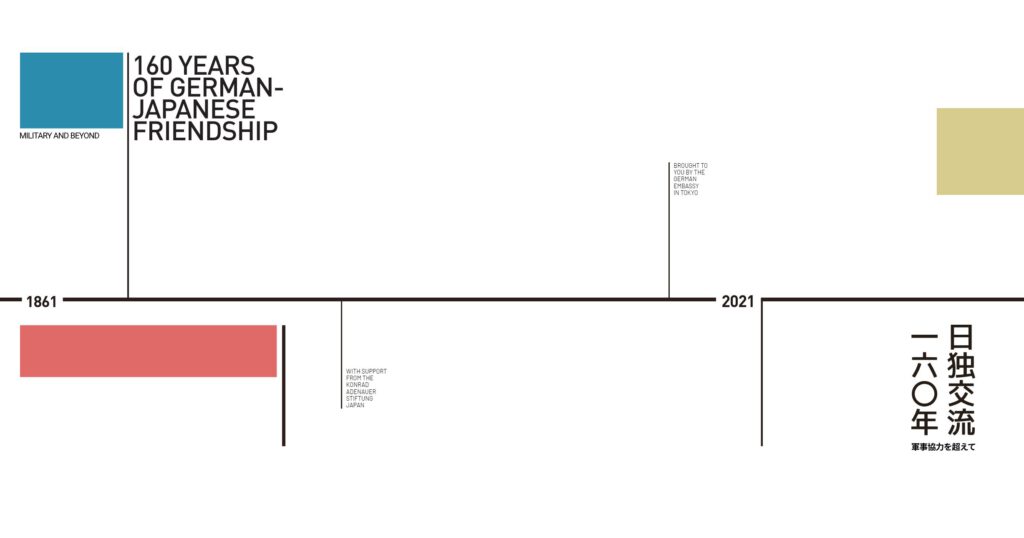On occasion of 160 years of German-Japanese diplomatic relations, here’s a short overview of German influences on early Meiji Japan.
- The official relations between a German state (Prussia) and Japan started with a diplomatic mission led by Count Friedrich Albrecht zu Eulenburg.
- Japan adopted the German legal system, medical education, and military training in the Meiji era.
- There was also a startling number of German language teachers in Japan. Actually, when an Okinawan sensei took me to a befirended doctor, the official doctor of the 1st Karate Kobudo World Championships in Okinawa in 1997, that doctor asked me to tell him about karate in Geman – as a physician, he has learned German and could understand it, although, he said, he couldn’t speak it well.
- There was also a non-aggressive foreign policy of the German government.
- Between 1885 and 1894, a number of prominent military advisors – Klemens Jacob Meckel, Hermann von Blankenburg, Erich von Wildenbruch, and Alexander Freiherr von Grutscheiber – came to Japan, playing significant roles in transforming the Japanese army into a capable organization.
- Many ostensibly friendly gestures by the German state were well-received by the Japanese. In 1881, the German Studies Society (Doitsu-gaku Kyōkai, Verein für deutsche Wissenschaften), which was meant to promote all intellectual and research activities related to Germany, was founded by a number of high-profile Germanophile politicians, diplomats, and scholars such as Katsura Tarō (three-time Prime Minister), Katō Hiroyuki (President of the University of Tōkyō), Inoue Kaoru, Aoki Shūzo (Ambassador to Germany), and Inoue Kowashi (high-profile bureaucrat).
- Two years later, in 1883, the society even created its own preparatory school, the School of German Studies Society (Doitsu-gaku Kyōkai Gakkō), to educate a future generation of leaders in the spirit of the German system. At the same time, in 1881, the University of Tōkyō, the nation’s foremost institution of higher education, stipulated that
- “Students in the Department of Science and Literature are accordingly required to study German instead of choosing between France and German […] since it is believed that Germany is the country where the sciences […] have reached the highest comparative development.”
- Meanwhile, an increasingly large number of the scholarship recipients of the Ministry of Education – the very best of the Japanese students who had been educated by foreign teachers in Japan – chose to study in Germany. Between 1875 and 1881, students sponsored by the Ministry of Education were evenly divided among Germany, Great Britain, France, and the United States. From 1882, however, a majority (88 out of 108 students who went abroad between 1882 and 1897) decided, regardless of their academic disciplines, to go to Germany. Indeed, the reputation of German universities had risen so high in Japan that, according to sociologist Tomihide Kashioka, by around 1890, “One could not afford to not set foot in Germany to claim topflight scholarship.”
- The Japanese infatuation with Germany and things German affected other areas of Japanese life and politics as well. The Meiji Constitution of 1889 was crafted after the Prussian model, under the heavy influence of German legal advisors. A German musician from Silesia, Franz Eckert, also composed the Japanese national anthem.
- Likewise, a German arhcitect, Wilhelm Böckmann designed the Ministry of Justice building in Tōkyō. In short, as historian Sven Saaler has noted, the 1870s and 1880s were the “golden years of German-Japanese relations.”
- In many ways, these golden years were made possible by Imperial Germany’s lack of aggressive foreign initiatives in East Asia and elsewhere in the world, which set it apart from Russia, Britain, and France.
- BTW, Erwin von Bälz was the personal physician of the imperial family and fought for the reintroduction of martial arts in Japan. Actually, he was a member of the committee that looked into the introduction of various budō into the Japanese school system and even trained jūjutsu, kyūjutsu and kenjutsu himself to popularize native sports to the Japanese themselves, and with the intention for them to readopt them.

https://www.germanyinjapan160.com/en/
Sources and recommended reading:
Hoi-eun Kim: Made in Meiji Japan: German Expatriates, German-Educated Japanese Elites and the Construction of Germanness. Geschichte und Gesellschaft. 41. Jahrg., H. 2, Rethinking Germans Abroad (April – Juni 2015), pp. 288-320 (33 pages). Published by: Vandenhoeck & Ruprecht (GmbH & Co. KG)
© 2021 – 2022, Andreas Quast. All rights reserved.
